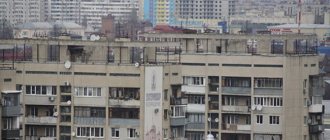How to register a wife or husband in a non-privatized (municipal) apartment
In accordance with the current principles of family law, spouses are obliged not only to financially support each other, but also to provide housing. If one of the spouses has a residence permit in the apartment in which he will live on the basis of a social tenancy agreement, he has the right to register the second spouse at his place of residence.
Article 70 of the RF IC states that when registering a close relative (parents, children, spouses), the consent of all residents will not be required. But if the user is going to organize registration for a sister, brother or other relatives, then the procedure will follow standard rules with permission from the employer and the consent of all residents.
It is also worth noting the fact that registering a wife in a non-privatized apartment will not be difficult, since municipal authorities will not take into account the area of the apartment.
According to standard rules, if each resident has less than 10 square meters of living space, registration may be refused. In the case of registration of spouses, this rule will not be taken into account.
To complete registration, one of the spouses who has permanent registration in the specified living space is required to submit an appropriate application with a request to register the husband (wife), and provide originals and copies of the couple’s passports, and a marriage certificate confirming their close relationship.
Features of registration of a relative
The procedure for registering a relative of the tenant in a non-privatized apartment depends on the degree of relationship with the new tenant.
Close relatives are registered by the employer without any difficulties; permission from other registered citizens is not required. According to the Family Code of the Russian Federation, close relatives are spouses, parents, and children.
To register other relatives (brothers, sisters, uncles, nephews, etc.) in municipal housing, it is necessary to provide written consent from all residents registered in the apartment.
The RF IC contains the obligation of spouses to provide material support to each other, including providing the spouse with living space. Based on this, a spouse has the right to register a spouse in his non-privatized apartment only on the basis of his own application without obtaining the consent of other registered persons. In the event of further privatization of municipal housing, each spouse has the right to participate in the apartment privatization procedure.
Similar rules also apply to children. Parents have the right not to obtain the consent of other registered residents to register minor children in municipal housing. The application is submitted by one of the parents to the migration service department (or to the MFC) on behalf of the child.
If the parents have registration in different places, the minor is registered with one of the parents with the written permission of the other, for example, with the mother, to which the father gives his consent. After which, deregistration of a child is allowed only if he is simultaneously registered at another address.
The apartment in which the child is registered can be sold only with the approval of the guardianship authorities.
Rules for registering a non-relative tenant
The registration procedure for a non-relative resident is in general similar to the usual one, but with certain exceptions. To submit an application for registration of a citizen with the migration service, you need to obtain the consent of other citizens registered in non-privatized housing.
Employees of the registration authority check for compliance with the standards for the provision of living space per person, i.e. minimum area for each resident.
Specific municipalities have adopted their own standards that must be observed when registering new residents. If non-compliance with the requirements is detected after the registration of a new tenant, the FMS will refuse registration in a non-privatized apartment.
The need for municipal consent
Until citizens living in a non-privatized apartment, on the basis of a social tenancy agreement, have transferred it into private ownership, it belongs by right of ownership to municipal authorities.
In this regard, only the local administration:
- has the right to dispose of this residential premises at his own discretion;
- Coordinates registration of other residents in the apartment;
- Concludes social rental agreements.
Therefore, when submitting an application to the MFC, regardless of which citizens are registered (with the exception of young children), it is necessary to obtain the consent of the local government body, represented by the Municipal Property Management Committee.
Currently, when registering in non-privatized housing, an applicant may not provide consent from the administration, but in this case, the registration procedure may take not 5, but up to 10 days, since the migration service will be forced to independently request all the missing information from municipal authorities in the manner of interdepartmental interaction .
Without obtaining the consent of the local administration, only by his own decision, the tenant of a municipal apartment does not have the right to dispose of this living space (for example, sell, exchange) or register other residents.
Who can be registered without consent
There is no need to obtain permission from citizens registered in a non-privatized apartment if it is necessary to register for the following persons:
- minor children;
- close family members (spouse, parents).
In other cases, the written consent of all citizens registered in the non-privatized living space should be obtained in advance. This is a mandatory condition for the migration service to accept documents from the applicant and to carry out legal registration at the place of residence.
How to register a child in a non-privatized apartment
A close relative can be registered in an apartment according to a simplified scheme. If a minor child is registered in the apartment, then consent from other residents will not be required, however, provided that at least one of the child’s parents is already registered here.
In all other situations, you will have to negotiate with other residents and representatives of municipal authorities.
However, it should be remembered that registering a child in a non-privatized apartment will be much easier if one of his parents is already registered here.
In our other article you will find more information on how to register a child in an apartment. ⇐
Residents' rights
A non-privatized apartment is a living space that is owned by the state, that is, by the landlord. Thanks to the social tenancy agreement, the tenant, that is, the tenant, has the opportunity and legal right to use it.
The Housing Code of the Russian Federation is a document that regulates and defines the rights and obligations of tenants, as well as family members registered with them in this living space. The tenant, who is also the employer, is obliged to keep it in a favorable condition and bear responsibility for this. He has the following rights:
- directly reside in it;
- register relatives, family members or other persons with the consent of the residents living with him who have reached the age of majority, and for each of them the total housing area must be at least 6 square meters. m. in accordance with the Housing Code, which establishes social norms;
- sublease to temporary residents, providing them with shared accommodation;
- exchange for equivalent other living space.
The tenant and other residents have different rights and obligations regarding non-privatized housing. You cannot dispose of it completely at your own discretion, since it is municipal property .
Rules for registering a minor child
Dear readers!
Our articles talk about typical ways to resolve legal issues, but each case is unique. If you want to find out how to solve your specific problem, please contact the online consultant form on the right →
Or call us by phone (24/7).
It's fast and free!
For children who have not reached the age of majority, the place of residence is considered to be where their parents are registered. In the case where they live separately, the child is registered where he is most of the time. That is, to the parent with whom he actually lives.
The procedure for registering a minor child in the residential space in which his father or mother lives, including non-privatized ones, does not require the consent of both the tenant himself and other adult residents living with him.
Restrictions on actions with the apartment
Tenants of non-privatized housing are faced with a number of restrictions and the impossibility of performing certain actions with the apartment, such as:
- sales;
- rental (whole);
- inheritance.
Such an apartment becomes the full property of the state if all residents are discharged from it, which can happen for the following reasons:
- moving;
- death.
It is worth considering that if one tenant is registered in it, then when he is discharged, he immediately loses his rights to this living space.
Upon eviction
In addition, the state has the right to evict a citizen from a municipal apartment for a number of reasons:
- Unreasonable lack of payments for utilities, the debt for which exceeds six months. In this case, the tenant, together with the rest of the family members living in this apartment, is evicted through the court to another premises under a social tenancy agreement (STN), namely to a hostel.
- Violation by the tenant and other residents of a non-privatized residential area of the rights of neighbors, use of the apartment for other purposes that do not comply with the law. In this case, residents are first given an official warning
. If after this the actions that led to this state of affairs are not suspended, the tenants will be evicted without providing alternative space.
If residents of a non-privatized apartment are forced to evict due to the demolition of the building, its recognition as an emergency or other similar reasons, the state is obliged to provide the tenant and other registered residents with other comfortable housing, as stated in the Housing Code of the Russian Federation.
The most common reason is debt on utility bills. Whereas if the apartment were privatized, it would be impossible to do this
. The maximum that could happen is a temporary shutdown of water or electricity until the debt is repaid.
After the death of the employer
If the only tenant and the resident registered in a non-privatized apartment dies, then it immediately becomes the property of the municipality. And other interested parties do not have the right to live in this living space
. However, there are rules that guarantee accommodation:
- those who received the authority to live on it by a court decision;
- family members of the deceased who previously lived with him;
- a tenant moving in disabled citizens with whom they were living together.
The above categories of persons have the right to draw up a social tenancy agreement in their name, which is guaranteed by the Housing Code. But for this it is necessary that their data be included in the original version of the contract, and also that other family members and other persons equal to them in rights give their consent.
. It is also necessary to agree with the body representing the interests of the landlord - the state in whose ownership the premises are located.
Temporary registration in a non-privatized apartment
If necessary, all residents living in a municipal apartment have the right to obtain temporary registration. However, it should be taken into account that due to the restriction of certain rights, this procedure will have its own subtleties and nuances.
The main advantage of temporary registration is the fact that a person does not have to be discharged from his permanent place of registration.
In fact, temporary registration in a non-privatized apartment will be valid simultaneously with permanent registration, and therefore the user will have much fewer difficulties.
Temporary registration in a municipal apartment
As with standard registration, obtaining temporary registration will require the consent of all apartment residents. If it is not received, it will be virtually impossible to register the person.
Temporary registration in a municipal apartment is absolutely identical to the standard registration procedure, the only exception is that when submitting documents you must also fill out an application in Form-1.
Registration in a municipal apartment for a non-relative
In the case of registration in an apartment of a citizen who is not a relative of at least one of the permanent residents, registration in a municipal apartment of a non-relative will proceed in the standard way. This means that written consent for registration will be required from the tenant (municipality) and all residents who are over 18 years of age.
However, here the accounting norm of living space per person is necessarily taken into account. If, as a result of registration of a new person, the accounting norm is less than 10 square meters, registration will be denied.
Registration fee
How much does the registration procedure cost? This question is asked by many citizens who want to register in a non-privatized apartment. According to the law, registration is free of charge. There are no duties to pay.
How long can you live without registration, read the article: How long can you live without registration.
But often separate expenses will still be required. For example, if the tenant of the apartment cannot personally visit the FMS office, then a representative can act on his behalf by power of attorney, which must be drawn up in a notary office and a certain amount paid for it (about 800 rubles).
Video: How to register in a municipal apartment:
(No Ratings Yet)
Registration procedure
In general, the registration procedure will consist of several key stages:
- Visiting municipal authorities and obtaining permission to register.
- Obtaining written consent from all residents living in the apartment under a social tenancy agreement. If at least one signature is missing, registration will not be possible.
- After this, you need to prepare documentation for registration. Once the complete package is ready, you can submit an application with documentary support to the registration authority, which will carry out the registration procedure.
- The applicant expects a response within 3-7 days, and if the registration of a new user does not contradict the current rules of law, at the end of the specified period the applicant will receive a positive response.
What rights does registration give?
In this article we talk about typical options for resolving legal issues, but each case is unique. Take advantage of a free consultation specifically for your specific case, call right now by phone: (it’s free) +7 Moscow +7 St. Petersburg +7 ext. 636 - 24-hour toll-free line throughout Russia
In the case of a municipal apartment rented under a social tenancy agreement, permanent registration gives the tenant the following rights guaranteed by Russian legislation:
- use of residential premises;
- moving your minor children into the apartment without the consent of other residents and the landlord;
- moving relatives into the apartment with the consent of the other tenants;
- obtaining other municipal housing in case of exchange or as a result of emergency situations;
- participation in the privatization of this housing.
The last point – privatization – plays a key role when registering in a municipal apartment. In accordance with the Housing Code of the Russian Federation, any person with permanent registration in rental housing can claim a share if the property is privatized. This possibility often becomes the cause of quarrels.
Consent of permanent residents
To register a new tenant, it is mandatory to obtain the consent of both the permanent residents of the apartment and the owner, who is the local administration.
As practice shows, the municipal authority most often does not interfere with the registration of citizens, therefore the main problem is related to other residents, or more precisely, with their disagreement.
Once consent is received and in writing, registration will proceed as quickly as possible. To do this, the new resident will have to contact the authorized authorities, provide his passport for registration and written consent from all residents.
What to do if consent could not be obtained
Formally, in the absence of consent to registration from all citizens who are registered and live in municipal housing, it will be impossible to register the user. However, our legal system has some conflicts that make it possible to change the situation.
So, if you evict a dissenter, then he will lose the right to vote, and his dissent will be canceled. It is worth remembering that a person can be evicted from public housing on the following grounds:
- A person does not live in an apartment for a long time.
- He has accumulated utility debt for more than 6 months.
- The tenant behaves inappropriately, causing his neighbors to feel uncomfortable.
- Uses the housing for other purposes. For example, he does not live in an apartment, but uses it as a retail outlet or workshop.
Please note that in situations where it is impossible to evict a dissenting owner, registering a new person is unlikely to be successful.
Additional Information
It is impossible to remove a tenant from the living space he occupies without his consent. If the tenant and his family move to another place of residence, the social tenancy agreement is considered terminated from the date of departure.
Article 83 of the Housing Code of the Russian Federation lists the reasons on the basis of which a landlord can forcibly evict a tenant:
- is more than six months behind on rent;
- causes damage or destroys the apartment transferred to him;
- uses the apartment for other purposes (for example, uses it as a workshop);
- creates brawls, gets into trouble with neighbors and other residents of the apartment.
If the tenant falls under one of these clauses, the landlord has the right to file a claim in court. And only after a court decision can the tenant be evicted from the space he occupies with the termination of the social tenancy agreement.
If difficulties arise with registration in a municipal apartment, the lawyers on our website are always ready to provide information support.
Registration in a non-privatized apartment has its own characteristics, but it is not much more difficult than in a privatized one. The main problem is obtaining permission from all adult employers. Otherwise, the differences are insignificant and should not cause any difficulties when obtaining registration.
https://www.youtube.com/watch?v=V0hViN9QJto
890
List of documents for registration in a non-privatized apartment
To take steps to register a person in municipal housing, you will need to contact the territorial division of the FMS and provide a specific list of documents for registration in a non-privatized apartment:
- Passport of the potential tenant;
- Written consent of all citizens living in the apartment (provided that they have reached the age of 18);
- Social tenancy agreement, which will be amended to indicate a new tenant;
- An application in an approved form, signed by the tenant and the tenant;
- Military ID, if available;
- Departure sheet from the previous place of registration.
Registration of close relatives and minor children
As already mentioned, any tenant of a non-privatized apartment has the right to move his relatives and children into it.
There is an opinion that the consent of other residents is not required to register a spouse, parent or other close relative in municipal housing. But that's not true. In Art. 70 of the Housing Code of the Russian Federation clearly states that in order to move into an apartment rented from the municipality, written permission from other tenants is required.
There is only one situation when it is possible to register in a non-privatized apartment without the consent of other tenants. It concerns the minor children of one of the residents.
To register a child, the legal representative (parent or guardian) is the registered tenant; neither the consent of other tenants nor the permission of the landlord (municipality) is required. That is, registration takes place in a simplified manner. In this case, the area limitation does not work either. Even if the square footage of the apartment is not enough to accommodate one more person, you can still move in a child. This exception is justified by the Family Code of the Russian Federation, according to which children are guaranteed the right to live with their parents.
Thus, registering in a municipal apartment is a little more difficult than registering in privatized housing. It is not always possible to quickly resolve the issue with the consent of the other tenants and the permission of the landlord. However, this mechanism has long been debugged. And with normal relations with other employers, obtaining a residence permit will not be difficult.
Where to contact
You can apply for registration in municipal housing at any authority where there is a passport office. For example, depending on the form of house management, this procedure will be handled by employees of the HOA or housing department.
You can also start the registration procedure through the State Services portal or the MFC. However, there are some nuances here. The application for registration must be confirmed by all citizens over 18 years of age living in the apartment, and in addition, the document must be submitted exclusively in person.
Recently, citizens are increasingly using the services of the Federal Migration Service. Here it will be the fastest to register in a municipal apartment.
Features of this procedure
During registration, all persons registered in the housing must be present in person.
If the registration of the tenant's relatives is carried out, then no consent is required, and the living space standard will not be taken into account.
If it is planned to register a citizen who is not related to the tenant, then it will be possible to register it only after obtaining the preliminary consent of all persons registered in the housing and the landlord, that is, the municipal body.
As a prerequisite, the living space standards per person will also be taken into account.
These are the main rules and features that must be observed when registering in public housing.
Legal acts
Municipal housing has a certain legal status. Unlike registration, which is carried out by the owner of the property and is regulated by civil law, questions regarding registration in municipal housing find answers in Article 70 of the Housing Code of the Russian Federation.
It is this regulatory act that contains the basic conditions associated with moving into and registering in municipal housing.
According to the norms of housing legislation, a housing tenant does not have the opportunity to register new persons without obtaining the consent of all previously registered residents of the territory.
Housing legislation separately addresses issues related to the registration of newborns or new family members.
Registration according to the law of these circumstances is carried out taking into account amendments to the social tenancy agreement, that is, entering information about new residents.
In addition to housing legislation, the registration procedure is regulated by Government Decree No. 713 of June 17, 1995 and Federal Law No. 5242-1.
Possible difficulties
As a rule, difficulties with registering and moving into a municipal apartment are associated with a lack of consent from the owner of the property and those already registered and living.
Particular difficulty may arise in the case where it is necessary to obtain the consent of a person who is actually registered in the apartment, but who has not lived there for quite a long time.
Otherwise, registration for municipal housing is quick and without much difficulty.










